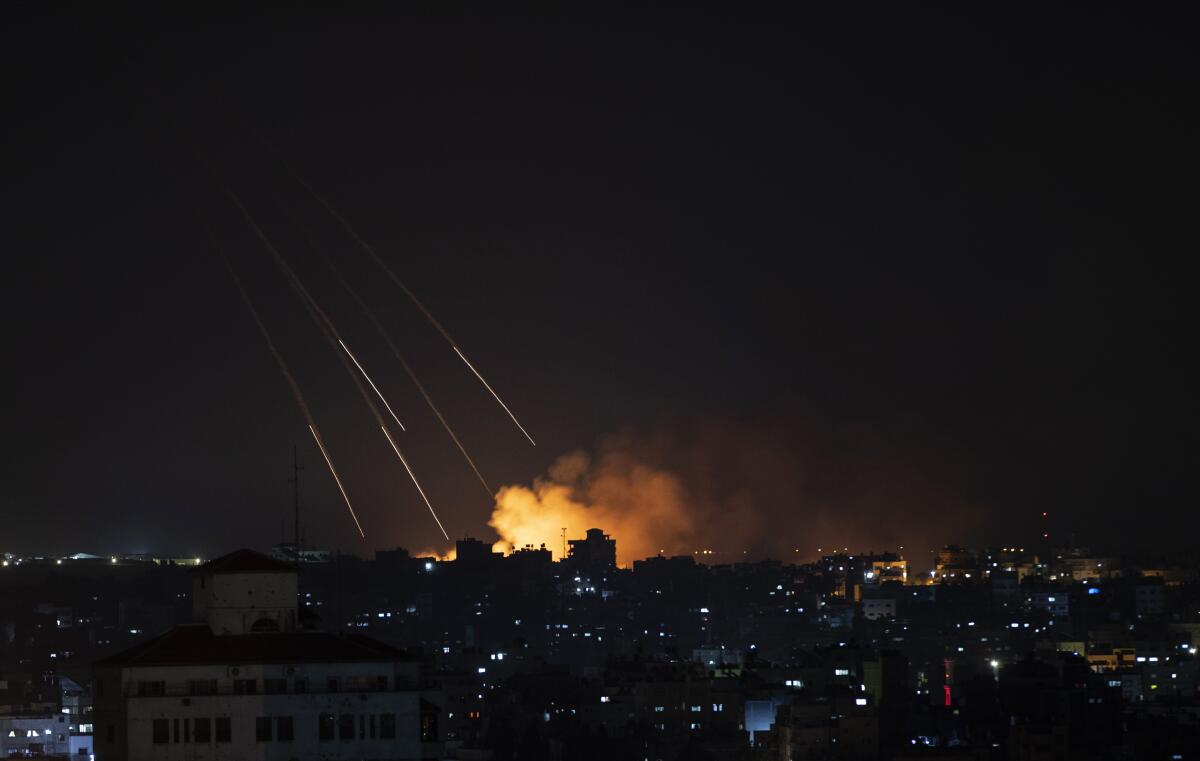Op-Ed: Israel needs to talk to Hamas to stop the bloody conflict

Israel must talk to the Palestinians — including Hamas — instead of continuously trying to crush them. Attempts at getting Palestinians to surrender have proven to be futile, so why not trying dealing with your adversaries in a logical manner? At this point, the idea of deterring conflict has become elusive because of the absence of a serious negotiation process.
Short of surrender, no conflict in the world can be solved by military means. Any resolution depends on negotiations — and naturally that means talking with your enemies, not your friends.
The U.S. negotiated with the Viet Cong and recently with the Taliban despite intense enmity with these groups. Washington has also tolerated the presence of a Hezbollah minister in various Lebanese governments that it had to deal with. Israeli Prime Minister Yitzak Rabin shook hands with Palestinian leader Yasir Arafat and attempted to make the peace of the brave until a Jewish radical cut the hopes of peace between Israelis and Palestinians short with an assassin’s bullet in 1995.
The Israeli policy of trying to vanquish Palestinians was put to the test this week. Palestinians have been fighting a population replacement policy, illegal under international law, in the Jerusalem neighborhood of Sheik Jarrah. Israeli authorities is supporting a settler organization that is attempting to evict Palestinian refugees from homes built by the Jordanian government and the United Nations Relief and Works Agency in the 1950s to shelter them.
Some 80 Palestinians will lose their homes, which will be “given” to Jewish settlers. The one-sided Israeli legal system allows Jews to settle in homes and on lands that they can claim to have at one time been Jewish. This theory, however, is not applied to Palestinians, who are denied the right to return to their homes in Israel.
Israeli police used extreme force to try to control thousands of Palestinians who were at Al Aqsa Mosque and protesting the Sheik Jarrah evictions as well as the planned march by right-wing Israeli extremists through Jerusalem’s Old City. In the past, right-wing rallies have resulted in attacks and vandalism against the local population and Palestinians in the Old City.
The videos of the brutality of the Israeli forces — including images of police flinging stun grenades and firing rubber bullets inside the mosque — outraged Palestinians and their supporters around the world. Hundreds of Palestinian protesters were injured and sent to hospitals. Hamas militants in Gaza, hearing pleas for help from Palestinians in Jerusalem, responded to the violence by firing rockets at Israel, drawing Israeli airstrikes in return.
By Friday, Israeli airstrikes against Hamas had killed 119 people, including 31 children, since the start of the conflict Monday, according to Gazan health authorities. Eight Israelis, including one soldier, have been killed by Hamas rockets, some of which reached the outskirts of Tel Aviv.
But Palestinians in Gaza are not about to surrender. On Friday, the Israeli military intensified the attack on Gaza with tanks and artillery, while inside Israel the fighting between right-wing Jewish citizens and Arab citizens grew. And so the cycle of violence and retaliation continues.
For its part, the Biden administration, which has declared human rights to be a main focus in its foreign policy, needs to put its words into action. President Biden repeating Israeli talking points — namely, that Israel has the right to protect itself — doesn’t help. Indeed, when a State Department spokesman was asked whether Palestinians have a right to protect themselves, he didn’t have an answer.
Biden must reiterate the illegality of Jewish settlements, including in East Jerusalem, which was stated in United Nations Security Council Resolution 2334, passed in the final days of the Obama-Biden administration. The Biden administration should raise the U.S. profile in demanding an immediate cease-fire and stop using rhetoric that legitimizes the continuation of the excessive and disproportionate use of force by the Israeli army.
By calling for guns to be put aside, the administration would be joining the United Nations, Egypt, the European Union, Russia and others. But for a cease-fire to work, it must be immediately accompanied by a political plan for talks aimed at dealing with the core elements of the conflict.
Only by suspending illegal settlement activities and talking to all legitimate Palestinian representatives, including Hamas, with seriousness and a genuine will to find a resolution can we move away from guns and rockets and begin building a just peace that can give Israelis lasting security and Palestinians independence and freedom from occupation.
Daoud Kuttab is a Palestinian journalist and a former professor of journalism at Princeton University. @daoudkuttab
More to Read
A cure for the common opinion
Get thought-provoking perspectives with our weekly newsletter.
You may occasionally receive promotional content from the Los Angeles Times.










